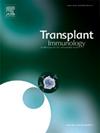Effects of intravenous immunoglobulin (IVIG) treatment on BK viremia and BK virus-associated nephropathy (BKVN) in kidney transplant patients: A systematic review
IF 1.4
4区 医学
Q4 IMMUNOLOGY
引用次数: 0
Abstract
Background
There are limited approved therapeutic options for BK viremia management in kidney transplant patients. We performed the present study to investigate the effect of Intravenous immunoglobulin (IVIG) treatment on BK viremia and BK virus-associated nephropathy (BKVN) in kidney transplant patients.
Methods
A systematic search was performed in Web of Science, Embase, PubMed, and Scopus for studies that investigated the effect of IVIG therapy on BK viremia and BKVN in kidney transplant patients. Observational studies and case series were considered eligible for inclusion in this study. Data extraction was performed by two independent investigators by a standard checklist.
Findings
Our results indicated that IVIG treatment in patients with BKVN was effective in BK viremia treatment and nephropathy. In addition, preemptive IVIG significantly decreased the risk of BK viremia and BKVN in high-risk patients. However, it does not seem that IVIG treatment has a beneficial impact on allograft function. Because no significant improvement in serum levels of creatinine has been reported in previous studies. In addition, the presence of interstitial fibrosis or tubular atrophy was reported in studies with histopathological examinations of renal biopsies following IVIG treatment.
Conclusion
IVIG therapy combined with immunosuppression reduction may be beneficial in treating BK viremia and BKVN, but its impact on graft function and survival remains uncertain. Further studies are needed to clarify its role in kidney transplant outcomes.
静脉注射免疫球蛋白(IVIG)治疗肾移植患者BK病毒血症和BK病毒相关肾病(BKVN)的影响:一项系统综述
背景:肾移植患者BK病毒血症的治疗方案有限。本研究旨在探讨静脉注射免疫球蛋白(IVIG)治疗肾移植患者BK病毒血症和BK病毒相关肾病(BKVN)的效果。方法:系统检索Web of Science、Embase、PubMed和Scopus中有关IVIG治疗肾移植患者BK病毒血症和BKVN的研究。观察性研究和病例系列被认为符合纳入本研究的条件。数据提取由两名独立调查员按照标准检查表进行。结果:我们的研究结果表明,IVIG治疗BKVN患者对BK病毒血症治疗和肾病有效。此外,预防性IVIG可显著降低高危患者发生BK病毒血症和BKVN的风险。然而,IVIG治疗似乎并没有对同种异体移植物功能产生有益的影响。因为在以前的研究中没有报道血清肌酐水平有显著改善。此外,在IVIG治疗后肾活检的组织病理学检查中报告了间质纤维化或小管萎缩的存在。结论:IVIG联合免疫抑制减少治疗BK病毒血症和BKVN可能有益,但对移植物功能和存活的影响尚不确定。需要进一步的研究来阐明其在肾移植结果中的作用。
本文章由计算机程序翻译,如有差异,请以英文原文为准。
求助全文
约1分钟内获得全文
求助全文
来源期刊

Transplant immunology
医学-免疫学
CiteScore
2.10
自引率
13.30%
发文量
198
审稿时长
48 days
期刊介绍:
Transplant Immunology will publish up-to-date information on all aspects of the broad field it encompasses. The journal will be directed at (basic) scientists, tissue typers, transplant physicians and surgeons, and research and data on all immunological aspects of organ-, tissue- and (haematopoietic) stem cell transplantation are of potential interest to the readers of Transplant Immunology. Original papers, Review articles and Hypotheses will be considered for publication and submitted manuscripts will be rapidly peer-reviewed and published. They will be judged on the basis of scientific merit, originality, timeliness and quality.
 求助内容:
求助内容: 应助结果提醒方式:
应助结果提醒方式:


